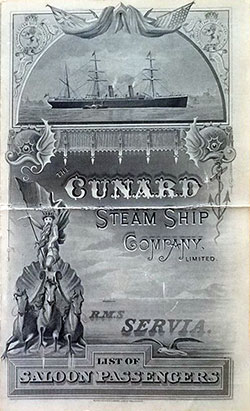1882 Passenger Lists – Castle Garden Era
📜 Abstract
Passenger lists from 1882 reflect the Castle Garden era of transatlantic migration, when steamship technology was rapidly advancing. These records survive as both elegant souvenir lists and practical manifests, preserving the names, occupations, and nationalities of travelers. They remain invaluable to genealogists, historians, educators, and collectors studying the social fabric of late 19th-century migration.
Overview
Passenger lists from 1882 provide a window into the changing world of ocean travel, when larger, faster, and more modern steamships were reshaping transatlantic crossings.
Souvenir Passenger Lists 🖼️ – Distributed to Saloon and Cabin passengers, these often featured ornate typography and artistic covers.
Ship’s Manifests 📜 – Handwritten documents submitted to U.S. authorities, listing passengers across all classes for official records.
Both types complement one another, offering a fuller picture of the people and voyages of 1882.

1882-07-08 RMS Servia Passenger List
Steamship Line: Cunard Line
Class of Passengers: Saloon
Date of Departure: 8 July 1882
Route: Liverpool to New York
Commander: Captain Cook
📌 Featured 1882 Passenger List: RMS Servia (Cunard Line)
Date of Departure: 8 July 1882
Steamship Line: Cunard Line
Class of Passengers: Saloon
Route: Liverpool → New York
Commander: Capt. Cook
Why it’s interesting:
⚓ The Servia was one of the most advanced Cunard liners of her time, among the first ocean liners built of steel rather than iron.
🧳 This list documents Saloon Class travelers, reflecting the comfort and prestige of elite transatlantic travel in the 1880s.
🎨 Surviving souvenir covers are prized for their design and rarity.
Image: Front Cover of a Saloon Passenger List from the RMS Servia of the Cunard Line, Departing 8 July 1882 from Liverpool to New York.
🌍 Historical Relevance
Immigration History: Though Castle Garden processed most westbound immigrants, eastbound passenger lists like this one show how Americans and expatriates returned to Europe for business, study, or family visits.
Ocean Travel: The City of Chester demonstrates the division of passengers into Cabin, Second Cabin, and Steerage, reflecting both luxury and hardship aboard the same ship.
Research Value:
🏫 Teachers & Students – Illustrates transatlantic migration and class structures.
🧑🤝🧑 Genealogists – A valuable record of names and details often missing from official ledgers.
📖 Historians – Documents the Inman Line’s role in connecting New York and Liverpool.
🗂️ Collectors – Souvenir covers are rare ephemera highly prized in maritime collections.
🛳️ Spotlight Note: RMS Servia (1882)
The RMS Servia, launched in 1881 for the Cunard Line, was a landmark vessel in ocean travel history. She was the first large passenger liner built of steel and among the very first to be fitted with electric lighting, marking a dramatic leap forward in ship design and passenger comfort.
Passenger lists from the Servia capture the prestige of Cunard’s Saloon service during a period when the line was competing fiercely with White Star and Inman. For genealogists, these lists record the journeys of business travelers, professionals, and emigrants who crossed aboard a technological pioneer. For collectors, any surviving Servia list is prized for its association with one of the most advanced liners of the 1880s.
✨ Related GG Archives Links
- Inman Line Passenger Lists Collection
- Castle Garden Immigration Station – Overview
- Souvenir Passenger Lists Collection
- New York Immigration Passenger Lists
📬 Help Us Grow the Collection
If you own or have access to a souvenir passenger list from 1880, we would appreciate a digital copy to help expand the archive. Please contact us at history@ggarchives.com.
⚠️ About Accuracy in Historical Records Research Tip
Context. The GG Archives presents passenger lists as faithfully as possible to the original documents. While OCR is generally accurate, portions of these collections—especially image captions and some transcriptions—are typed by hand and may include typographical or spelling variations. The original manifests themselves also contained clerical inconsistencies (names recorded phonetically, mid-voyage corrections, etc.).
What this means for your research:
- Search variant spellings of names (e.g., “Schmidt/Schmitt/Smith,” “Giuseppe/Joseph”).
- Cross-reference with immigration cards, passport applications, naturalization files, city directories, and newspapers.
- Treat manifests as primary sources with historical quirks—use them alongside corroborating records.
- For place names, consider historical borders and language variants (e.g., Danzig/Gdańsk, Trieste/Trst).
How to cite. When quoting a name from a manifest, consider adding [sic] for obvious misspellings and include a note such as “spelling as printed in original passenger list.”
Need help? If you spot a likely transcription error in captions, feel free to contact us with the page URL and a brief note—we love community input. 🙏
Curator’s Note
For over 25 years, I've been dedicated to a unique mission: tracking down, curating, preserving, scanning, and transcribing historical materials. These materials, carefully researched, organized, and enriched with context, live on here at the GG Archives. Each passenger list isn't just posted — it's a testament to our commitment to helping you see the people and stories behind the names.
It hasn't always been easy. In the early years, I wasn't sure the site would survive, and I often paid the hosting bills out of my own pocket. But I never built this site for the money — I built it because I love history and believe it's worth preserving. It's a labor of love that I've dedicated myself to, and I'm committed to keeping it going.
If you've found something here that helped your research, sparked a family story, or just made you smile, I'd love to hear about it. Your experiences and stories are the real reward for me. And if you'd like to help keep this labor of love going, there's a "Contribute to the Website" link tucked away on our About page.
📜 History is worth keeping. Thanks for visiting and keeping it alive with me.
